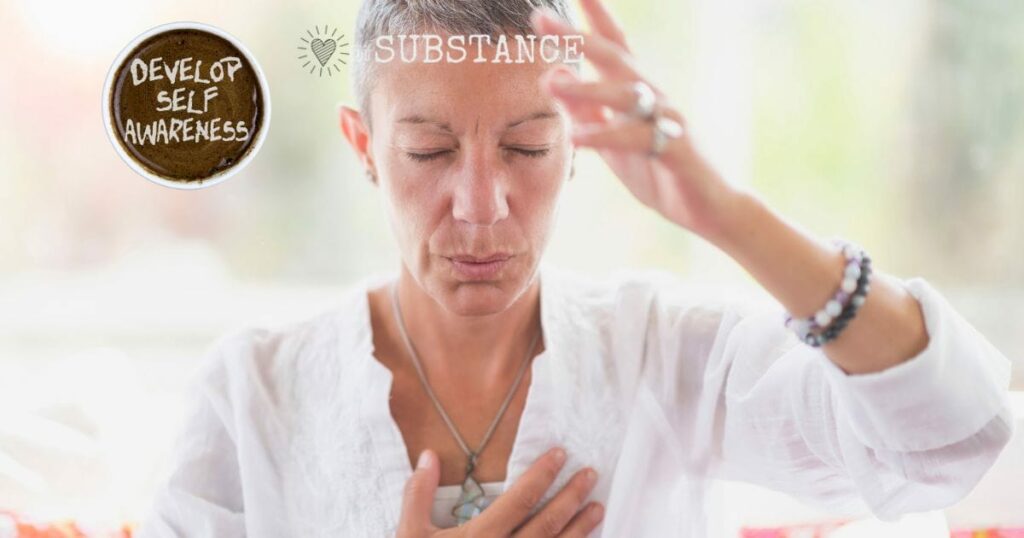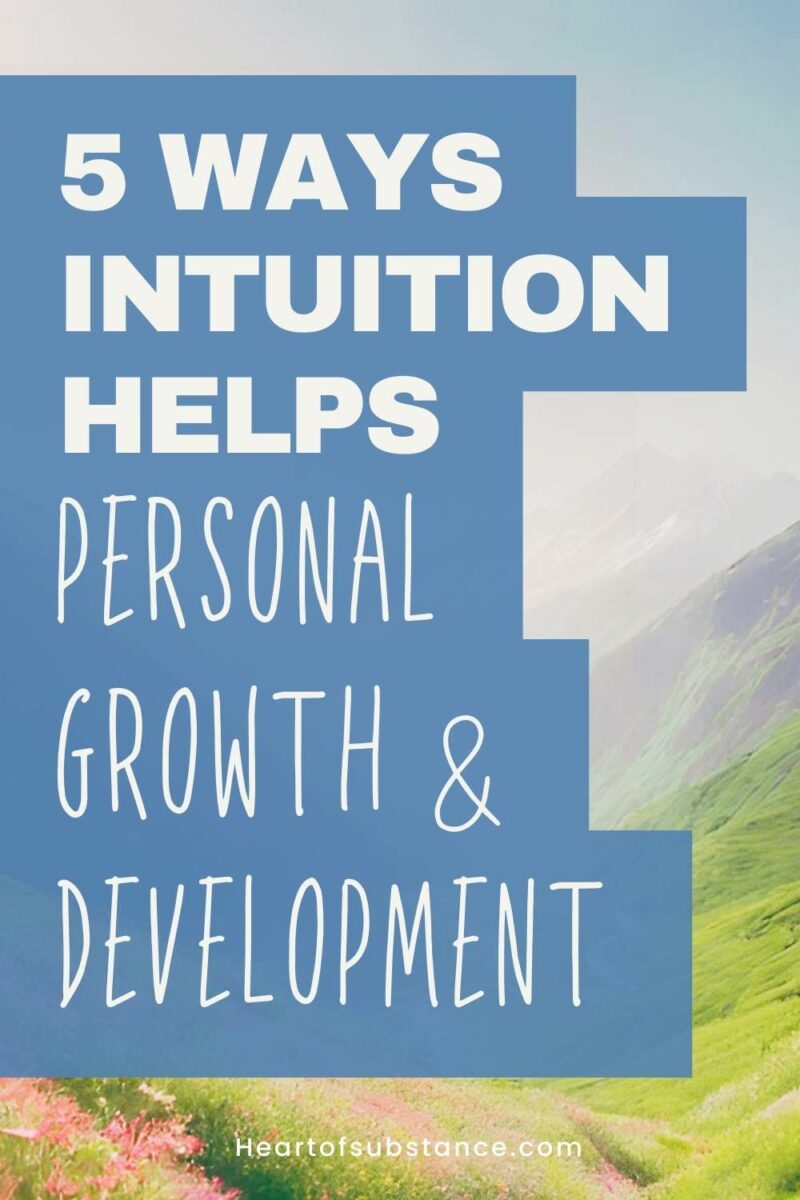I’m struck by the powerful connection between intuition and personal growth. It seems that the more I tune into my inner voice, the more in touch I am with my true self.

Self-awareness is about knowing your self in character, feelings, motives, and desires. When you are self-aware, you are more in tune with your self and can better recognize and trust your inner wisdom. You can get greater clarity on your life purpose and direction, and so self-awareness is vital for your growth in both your professional and your personal life.
One common pain point individuals face in relation to self-awareness is the fear of facing their own flaws and vulnerabilities. It can be uncomfortable and even distressing to confront aspects of ourselves that we may not like or want to acknowledge.
5 ways intuition helps personal transformation
- Paying attention to your gut feelings and bodily reactions in certain situations can make you aware of your emotional responses and triggers. This heightened self-awareness allows you to identify areas for improvement and personal growth more effectively.
- You can become aware of the patterns in your thoughts and behaviors that reveal underlying beliefs or values that you may want to examine more closely.
- Trusting your intuition when making decisions can help you align your actions with your true desires and goals on the road to personal growth. This can lead to increased self-confidence and a stronger sense of self-worth.
- Tuning into your intuition during meditation or mindfulness practices can offer insights into your subconscious thoughts and feelings including any blockages to you achieving growth in a certain area.
- Reflecting on past experiences and trusting your intuition to guide you toward positive growth and change can enhance your self-awareness and overall well-being.
This connection has been explored by many great thinkers, which include Socrates, Plato, Aristotle, Descartes, Kant, Nietzsche, and Jung.
1. Socrates — questioning inner voice
Socrates (469-399 BCE; Classical Athens) believed that by reflecting on our inner thoughts and feelings, we gain a deeper understanding of ourselves and our place in the world.
For example, Socrates often used the method of questioning to help his students explore their own beliefs and values. By asking them to think critically about their assumptions and biases, he encouraged them to develop a more nuanced understanding of themselves and their own perspectives.
Socrates claimed that by listening to our inner voice, we can gain insights into our own desires, fears, and motivations. For instance, Socrates believed that our dreams and unconscious thoughts could reveal important truths about ourselves that we might not be aware of in our waking life (Source: In Plato’s The Republic).
Most of what we know about Socrates comes from his student, Plato.
2. Plato — Innate understanding
Plato (427-347 BCE; Classical Athens) reasoned that intuition was a form of knowledge derived from an innate understanding of reality rather than from sensory perceptions. He had this theory of “forms” or “ideas”. These forms or ideas were universal concepts independent of how we perceived them.
For example, when we see a chair, we recognize it as a chair because we have an innate understanding of what a chair is. This understanding comes from our intuition, not from our sensory experience. We don’t need to see every possible variation of a chair to recognize it as such.
His concept of forms is in his work “Republic,” onwards from Book VI.
Plato also believed that by understanding the forms, we could come to a better understanding of ourselves. For example, if we understand the form of “justice,” we can better understand what it means to be a just person. This self-understanding leads to personal growth and development.
3. Aristotle — practical wisdom
Aristotle (384-322 BCE; Classical Athens) considered intuition essential for reasoning and decision-making. He reasoned that it enhanced self-awareness and one’s ability to reflect on their thoughts and actions.
For example, let’s say you’re walking down a dark alley and suddenly feel a sense of danger. This intuition draws on your subconscious knowledge of potential threats and informs your decision to either continue down the alley or turn back. By listening to this intuition, you are also becoming more self-aware of your own emotions and reactions to potentially dangerous situations.
Aristotle’s work “Nicomachean Ethics” looks at the concept of practical wisdom (phronesis) and its role in making sound judgments and choices based on an intuitive understanding of ethical principles and practical situations.
4. Descartes — Intuitive thinking
René Descartes (1596—1650; Early Modern France) believed intuition was fundamental to self-awareness.
Descartes gave us “cogito, ergo sum” — “I think, therefore I am“, forming the basis of his philosophy.
He argued that our intuition helps us to know ourselves better than we can know anything else.
“By ‘intuition’ [intuitus] I do not mean the fluctuating testimony of the senses or the deceptive judgment of the imagination as it botches things together, but the conception of a clear and attentive mind, which is so easy and distinct that there can be no room for doubt about what we are under- standing…Thus everyone can mentally intuit that he exists, that he is thinking, that a triangle is bounded by just three lines, and a sphere by a single surface, and the like” (Descartes’ works in Dika, 2023).
Descartes believed that our intuition helps us recognize certain truths about the world without the existence of empirical evidence. An example is how we realize the existence of God without physical evidence (Third Meditation in Meditations on First Philosophy; Ref).
>> See my article on intuitive thinking.
5. Kant — Inner sense
Immanuel Kant (1724–1804; Enlightenment Germany) explored the connection between intuition and self-awareness in his philosophical work “Critique of Pure Reason”.
He asserted that intuition, knowing something immediately without the need for reasoning, lends toward awareness of ourselves as thinking beings and of our mental state.
For example, when we feel sad or happy, we have an immediate intuition of our mental state. We are aware of ourselves as feeling beings. When we have a thought or a belief, our intuition allows us to be aware of ourselves as thinking beings.
“Inner sense is, according to Kant, the means by which we are aware of alterations in our own state” — McLear explains Kant’s take on ‘inner sense’ in Kant: Philosophy of Mind.
6. Nietzsche — Underlying motivations
Friedrich Nietzsche (1844-1900; 19th-century Germany) saw intuition as a way for individuals to access deeper truths about themselves and the world around them. He believed that intuition could uncover underlying motivations behind our actions and beliefs, helping us to better understand our desires and values.
One concrete example of this can be seen in Nietzsche’s concept of the “will to power,” which he saw as a fundamental drive underlying all human behavior.
He believed individuals could become more aware of their will to power through intuition and gain greater control over their lives so they could achieve their goals.
“Intuition…amounts to what Nietzsche calls ‘conviction’, or ‘the belief that on some particular point of knowledge one is in possession of the unqualified truth’” (Remhof, 2019 Inquiry article).
7. Jung — Symbolic patterns
Carl Jung (1875-1961 CE; 20th-century Switzerland) also believed that intuition played a critical role in the development of self-awareness.
Jung used the concept of archetypes to illustrate how intuition can inform self-awareness. Archetypes are universal, symbolic patterns that exist within the collective unconscious. By tapping into these archetypes through intuition, individuals can gain insight into their own motivations and behaviors.
Jung also explored the relationship between intuition and creativity. He believed that intuition played a key role in the creative process, allowing individuals to access new ideas and perspectives beyond their conscious awareness.
Jung’s use of archetypes in relation to intuition and self-awareness is noted in his book “Man and His Symbols” by Carl Jung and colleagues (1964).




